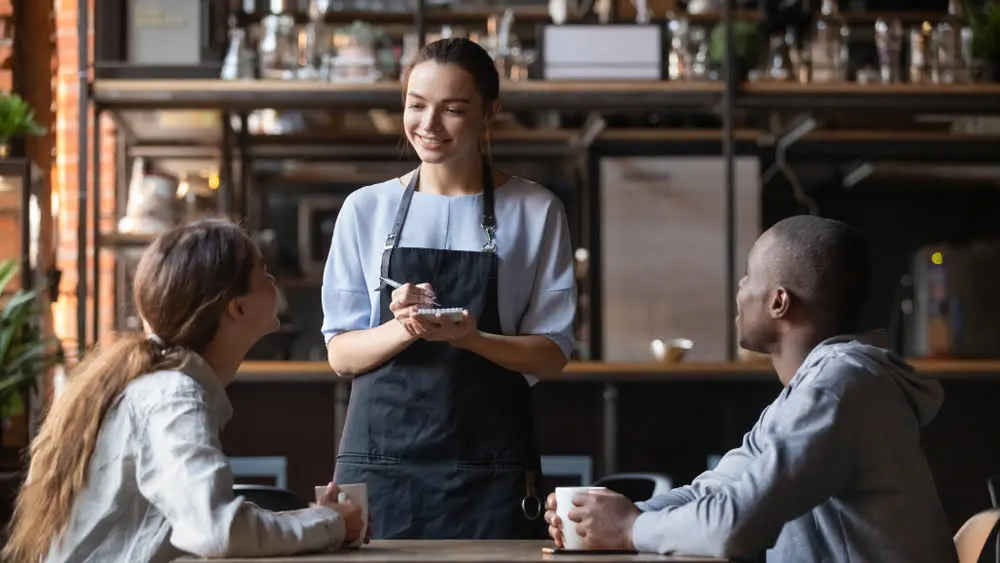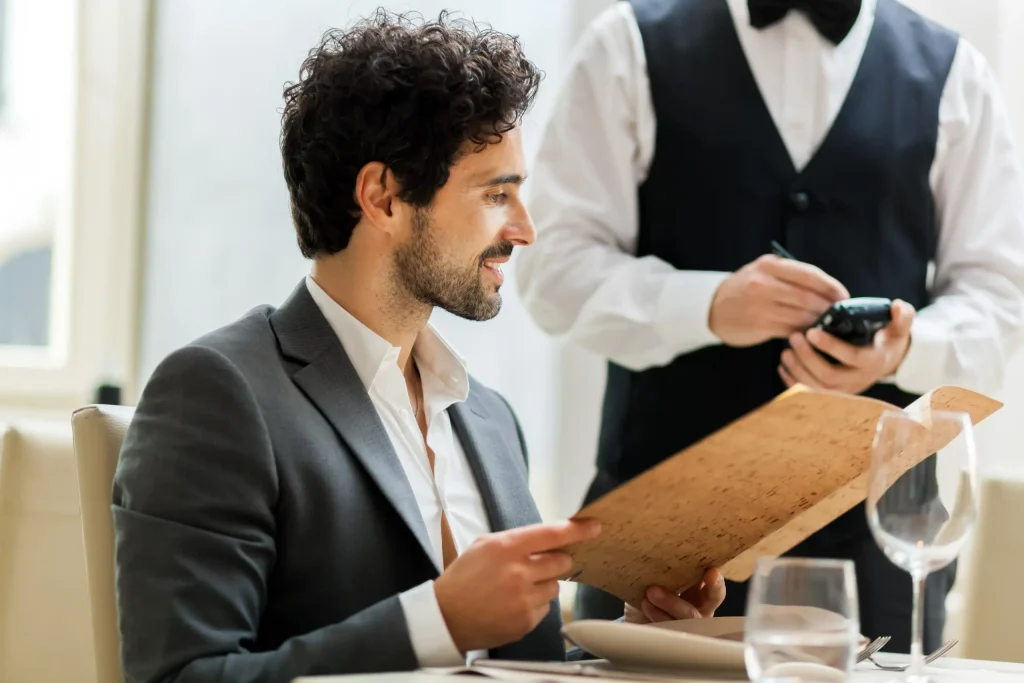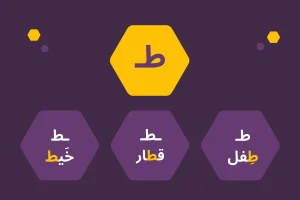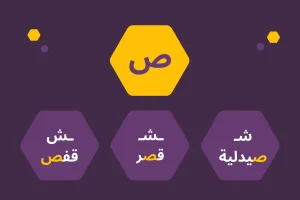
In our Arabic for Everyday series, we look at the essential language needed for everyday situations. In previous blogs, we learned Arabic phrases at the workplace and when shopping. Today, we focus on Arabic phrases at the restaurant. Dining out in an Arabic-speaking country can be a delight, filled with the aroma of spices and the taste of tasty dishes.
But to fully appreciate and enjoy your journey, it’s essential to familiarize yourself with some key Arabic phrases that will make your restaurant experience memorable and special.
In this blog post, we’ll share 13 must-know Arabic phrases that will help you communicate with waitstaff and savor every bite of your delicious meal.
Arabic Phrases at the Restaurant
Traveling to an Arabic-speaking country can be an exciting and enriching experience, but finding your way around airports in a foreign language can sometimes be scary. To make your journey smoother and more enjoyable, learning a few keywords and phrases in Arabic is essential.
In this blog post, we’ll introduce you to 15 must-know Arabic words and 8 questions and phrases that will help you confidently navigate through airports, from check-in and security to boarding and baggage claim.
In addition to necessary vocabulary, we will look at useful questions and requests, and provide real-life scenarios so you could practice your newly learned words and skills.
I have a reservation, please.
Ladá ḥajzun, min faḍlika.
لَدَى حَجْزٌ، مِنْ فَضْلِكَ
First of all, as you arrive at a restaurant and you want to check a pre-booked reservation, you can use the phrase “لديّ حجز، من فضلك” (I have a reservation, please).
I’d like a table for 3 people, please.
Urīdu ṭāwilatan lithalāthati ashkhāṣin, min faḍlika
أُرِيدُ طَاوِلَةً لِثَلَاثَةِ أَشْخَاصٍ، مِنْ فَضْلِكَ
When asking for a table, you can say: “أريد طاولة لثلاثة أشخاص” and you can simply replace the number ثلاثة as needed to accommodate your group size.
Can I see the menu, please?
Hal yumkinunī ruʼyatu qāʼimati aalṭṭaʻāmi min faḍlika?
هَلْ يُمْكِنُنِي رُؤْيَةُ قَائِمَةِ اَلطَّعَامِ مِنْ فَضْلِكَ؟
Next, we have a polite question: هل يمكنني رؤية قائمة الطعام من فضلك؟ (Can I see the menu, please?) This polite request will help you gain access to the restaurant’s menu and explore its offerings.
Do you have any specials today?
Hal ladaykum aṭbāqun khāṣṣatun aalyawm?
هَلْ لَدَيْكُمْ أَطْبَاقٌ خَاصَّةٌ اَلْيَوْم؟
In order to inquire about the restaurant’s daily specials or unique dishes, you can use the question: “هل لديكم أطباق خاصة اليوم؟” (Do you have any specials today?)
I am vegetarian/vegan
Anā nabātīyun
أَنَا نَبَاتِيٌّ
And in case you want to inform the waiter of your dietary preferences, you can use “أنا نباتي” (I am vegetarian/vegan).
I would like to order a corn salad
Awaddu ṭalaba salaṭati dhurah
أَوَدُّ طَلَبَ سَلَطَةِ ذُرَة
Use this structure أود طلب سلطة ذرة to order any dish by replacing “سلطة ذرة” with the name of the desired meal.
Can I have a glass of water, please?
Hal yumkinunī aalḥuṣūlu ʻalá kaʼsi māʼin min faḍlika?
هَلْ يُمْكِنُنِي اَلْحُصُولُ عَلَى كَأْسِ مَاءٍ مِنْ فَضْلِكَ؟
In order for you to stay hydrated you can politely request a glass of water using the question هل يمكنني الحصول على كأس ماء من فضلك؟ (Can I have a glass of water, please?).
Excuse me, can I have some more bread?
Udhran, hal yumkinunī aalḥuṣūlu ʻalá aalmazīdi min aalkhubzi?
عُذْرًا ، هَلْ يُمْكِنُنِي اَلْحُصُولُ عَلَى اَلْمَزِيدِ مِنْ اَلْخُبْزِ؟
Sometimes, you feel the need to ask for additional servings or accompaniments. So you can use this question.
The food is delicious
Aalṭṭaʻāmu ladhīdhun
اَلطَّعَامُ لَذِيذٌ
After you are done with the meal, you can express your satisfaction with the meal and show appreciation for the chef’s efforts by using the sentence: الطعام لذيذ (The food is/was delicious).
Can I take the rest to go, please?
Hal yumkinunī an ākhudha aalbāqī maʻī min faḍlika?
هَلْ يُمْكِنُنِي أَنْ آخُذَ اَلْبَاقِي مَعِي مِنْ فَضْلِكَ؟
I am sure all of us make sure no leftovers go to waste, so to request a takeout container for any remaining food, use this question: هل يمكنني أن آخذ الباقي معي من فضلك؟ (Can I take the rest to go, please?)
Can I have the bill, please?
Hal yumkinunī aalḥuṣūlu ʻalá aalfātūrati min faḍlika?
هَلْ يُمْكِنُنِي اَلْحُصُولُ عَلَى اَلْفَاتُورَةِ مِنْ فَضْلِكَ؟
When you’re ready to wrap up your meal, ask for the bill using this polite phrase هل يمكنني الحصول على الفاتورة من فضلك؟ (Can I have the bill, please?)
Thank you, the service was great.
Shukran, kānat aalkhidmatu rāʼiʻatan
شُكْرًا ، كَانَتْ اَلْخِدْمَةُ رَائِعَةً
Another useful phrase that can show your appreciation for the attentive service provided by the restaurant staff is شكراً، كانت الخدمة رائعة (Thank you, the service was great).
Do you accept credit cards?
Hal taqbalūna biṭāqāti aaliāʼtimāni?
هَلْ تَقْبَلُونَ بِطَاقَاتِ اَلِائْتِمَانِ؟
Finally, when you want to inquire about payment methods to ensure a smooth and hassle-free checkout, use the question هل تقبلون بطاقات الائتمان؟ (Do you accept credit cards?).
Real-life Scenarios

Now that we’ve gone through the 13 must-know Arabic phrases for a seamless restaurant experience, let’s put them into action. To help you visualize how these phrases can be applied in real-life situations, we’ve created two scenarios that cover the entire dining process from arrival to departure. These examples will demonstrate how the phrases can be used to communicate effectively with the waitstaff, navigate through the menu, and enjoy your meal in any Arabic-speaking country.
Ordering dinner at an Arabic restaurant
Customer
I’d like a table for 3 people, please.
أريد طاولة لثلاثة أشخاص، من فضلك
Waiter
Here’s your table.
تفضلوا، هذه طاولتكم
Customer
Can I see the menu, please?
هل يمكنني رؤية قائمة الطّعام من فضلك؟
Waiter
Of course, here’s the menu.
بالطّبع، ها هي قائمة الطّعام
Customer
Do you have any specials today?
هل لديكم أطباقٌ خاصّةٌ اليوم؟
Waiter
Yes, we have Chicken Kabsa today.
نعم، لدينا كبسة الدّجاج اليوم
Customer
I can’t eat meat, I am vegetarian.
لا أستطيع تناول اللّحوم، أنا نباتي
Waiter
No problem, I can recommend Fattoush salad or Vegetable Maqluba.
لا مشكلة، أقترح عليك تجربة سلطة الخُضارأو المقلوبة بالخضروات
Customer
OK, I would like to order Fattoush salad and Vegetable Maqluba.
حسنًا، أودُّ طلب سلطة الخُضار والمقلوبة بالخضروات
Waiter
Sure, would you like anything else?
طبعًا، هل ترغب في شيء آخر؟
Customer
Can I have a glass of water, please?
هل يمكنني الحصول على كأس ماء من فضلك؟
Waiter
Of course, I’ll bring your order shortly.
بالطّبع. سأحضر طلبكم حالًا
Wrapping up the meal and paying
Customer
Excuse me, can I have some more bread?
عذرًا، هل يمكنني الحصول على المزيد من الخبز؟
Waiter
Certainly, I’ll bring you more bread.
بالتّأكيد، سأحضر لكم المزيد من الخبز
Customer
Thank you, the food is delicious.
شكرًا، الطّعام لذيذ
Waiter
Thank you for your positive feedback. Would you like to have dessert?
أشكركم على تعليقكم الإيجابي. هل ترغبون بتناول الحلوى؟
Customer
No, thank you. Can I take the rest to go, please?
لا شكرًا. هل يمكنني أن آخذ الباقي معي من فضلك؟
Waiter
Of course, I’ll bring a container for you to take the leftovers.
بالطّبع سأضعه في علبة وأحضره لكم لتأخذوه
Customer
Can I have the bill, please?
شكرًا. هل يمكنني الحصول على الفاتورة من فضلك؟
Waiter
Of course, here’s the bill.
بالطّبع، هذه الفاتورة
Customer
Do you accept credit cards?
هل تقبلون بطاقات الائتمان؟
Waiter
Yes, we accept credit cards.
نعم، نقبل بطاقات الائتمان
Customer
Thank you, the service was great.
شكرًا، كانت الخدمة رائعة
Waiter
Thank you for dining with us, and we hope to see you again.
شكرًا لكم على زيارتكم ونتمنى رؤيتكم مجددًا
Final word
learning these 13 essential Arabic phrases will transform your dining experience in Arabic-speaking countries into an enjoyable and hassle-free affair. You will be able to order your meal, express gratitude, and engage in meaningful conversations with locals.
Remember, the more you use these phrases, the more confident and proficient you’ll become. To help you have more practice and check the new information you learned, we have created a Quiz that will test your knowledge and provide you with a chance to exercise.
Last but not least, we invite you to check our Planner which you can use to speed up your learning journey. This planner offers a rich 30-page worksheet accompanied by over 200 practical exercises and activities. It will serve as a powerful tool to back your acquired knowledge and newly learned language and push your learning journey forward with tons of practice opportunities.
We wish you the best of luck on your next restaurant outing and would like to tell you: bon appétit, or as we say in Arabic, بالهناء والشفاء “bil hana’ wa ash-shifaa’!”




